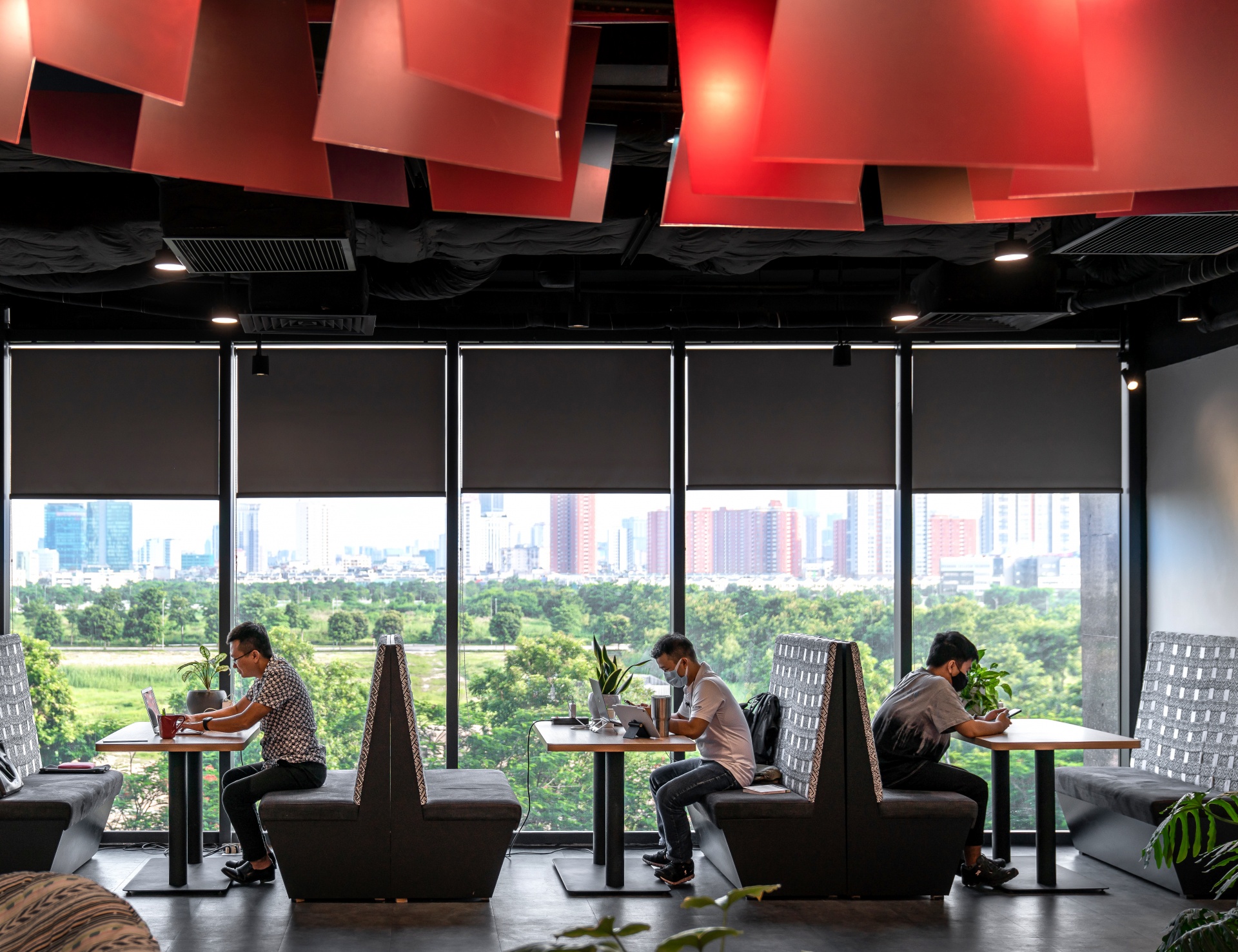Office market opens its doors to more flexible work models
 |
| Key trends are driving the office market post-COVID. Photo: Toong coworking space |
After a month of eased social distancing measures, Thanh Hang, a 32-year-old marketing executive, has just come back to her office in November. At first, she was very happy to meet her colleagues after five months of remote work. However, the excitement soon disappeared as she has been accustomed to working from home.
"I felt like an outsider when I come back to the office. During the social distancing period, I did everything online, such as meeting with my team and clients. I still prefer to work from home for the flexibility and convenience," she noted.
Therefore, she has asked her boss to switch to full-time remote work.
The pandemic has hastened a rise in remote work for several organisations. Nguyen Van Hau, CEO of Asian Holding, said that remote work has notable benefits. Companies can save on real estate costs and experience productivity gains, while workers can enjoy geographic flexibility, eliminate commutes, and report better work/life balance.
On the other hand, many companies have the challenge of maintaining on-site work and volatility during the pandemic. In particular, they have to fulfil obligations such as rents, investments, and office operations following fixed-term contracts with landlords.
Therefore, many businesses are changing the way they operate their offices to avoid risks and instead turn their monthly office rents into a flexible cost and switching to hybrid modes.
Chuo Senko Vietnam, which previously rented an office area of 500 square metres in the Ruby Tower in Ho Chi Minh City's District 1, is now relocating to a coworking space. Another US-based real estate company is also seeking a suitable coworking space for its office.
Commenting on this trend, Duong Do, founder and CEO of co-working space Toong said that, the biggest challenge for businesses after returning to offices is risk and cost management. Businesses need to ensure social distancing measures are executed well for their employees while managing fixed rents and monthly operating costs.
"Maybe they have to arrange employees to work alternate days or rent more space to accommodate all employees to follow through with social distancing. However, due to the pandemic, businesses opt for flexible solutions to adapt to different market conditions and constantly changing policies by the government," Do added.
Since last year, Toong has welcomed many prestigious companies such as KPMG, Deloitte, Connell Bros, Prudential, Dragon Capital, and Bayer. These multinational corporations have opted for separating their human resources into groups to work alternatively and reduce risks.
Do pointed out that flexibility and quality are two factors driving the trends in Vietnam's office market after the social distancing period. Maximising cost flexibility is one of the key factors to help businesses adapt to the rapidly changing market. However, it could be difficult for businesses to adapt to the pandemic if they are tied to an office with high initial investment costs and a fixed contract for many years.
In addition, through prolonged periods of social distancing, knowledge workers realise that mental health is extremely important, so they have higher requirements on workspace quality. This is the second factor that knowledge-based organisations should pay attention to to facilitate their employees in the new period. The quality of the workspace could also contribute to attracting and retaining talents, even affecting internal beliefs about the future of the organisation.
Daan Van Rossum, CEO of Dreamplex, said that during social distancing, many companies found that employees can get things done efficiently, no matter if they are working from home or in the office. Thus, many business owners have changed their perception of spending large resources on rents.
In traditional offices, businesses are paying rents based on size, whether employees are fully employed or not. Therefore, they are looking for a model with fewer desks, which translates to less space and lower cost.
“Many business owners working with Dreamplex are looking for a solution for a more integrated and flexible workspace model where employees can work from home, close to home or in the office. This is also known as the work from anywhere model," Rossum added.
What the stars mean:
★ Poor ★ ★ Promising ★★★ Good ★★★★ Very good ★★★★★ Exceptional
Related Contents
Latest News
More News
- Saigon Centre gains LEED platinum and gold certifications (February 12, 2026 | 16:37)
- Construction firms poised for growth on public investment and capital market support (February 11, 2026 | 11:38)
- Mitsubishi acquires Thuan An 1 residential development from PDR (February 09, 2026 | 08:00)
- Frasers Property and GELEX Infrastructure propose new joint venture (February 07, 2026 | 15:00)
- Sun Group led consortium selected as investor for new urban area (February 06, 2026 | 15:20)
- Vietnam breaks into Top 10 countries and regions for LEED outside the US (February 05, 2026 | 17:56)
- Fairmont opens first Vietnam property in Hanoi (February 04, 2026 | 16:09)
- Real estate investment trusts pivotal for long-term success (February 02, 2026 | 11:09)
- Dong Nai experiences shifting expectations and new industrial cycle (January 28, 2026 | 09:00)
- An Phat 5 Industrial Park targets ESG-driven investors in Hai Phong (January 26, 2026 | 08:30)

 Tag:
Tag:





















 Mobile Version
Mobile Version